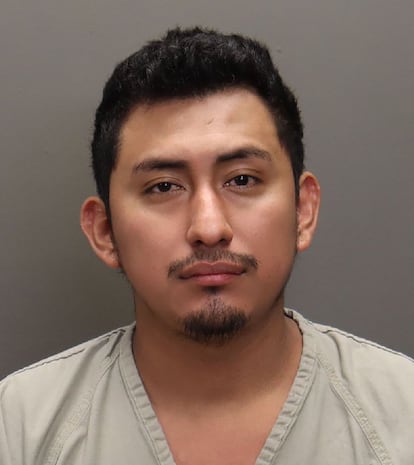Unyielding anti-abortion laws in the US put minors at risk
Political and media battles break out over the case of a 10-year-old rape victim who had to travel to another state to terminate her pregnancy


News about the 10-year-old rape victim who was forced to travel to Indiana (USA) from her home in neighboring Ohio in order to terminate her pregnancy has sparked a raging debate that illustrates the daily clashes breaking out in the United States after the Supreme Court overturned its 1973 Roe v. Wade ruling. Decisions on abortion rights are now up to each individual state, and a dozen have already moved to ban it outright, with no exceptions for cases involving rape or incest. That new reality foreshadows a bleak future for girls and adolescents in post-Roe America. According to the Guttmacher Institute, a leading research and policy organization for advancing sexual and reproductive health and rights in the US, 4,460 girls under the age of 15 became pregnant in 2017 (the latest year for which statistics are available). Almost half (44%) of these young girls opted to have an abortion.
The story that attracted so much attention was first reported by the Indianapolis Star. It begins on June 27, three days after the Supreme Court ruling, when gynecologist Caitlin Bernard received a call in her Indianapolis (the capital of Indiana) office from a colleague in Ohio who wanted to know if she could treat a girl who was more than six weeks pregnant, the limit for an abortion under Ohio law. Abortions are still legal in Indiana up to the 22nd week of pregnancy, but this is expected to change as soon as July 25, when a special session of the Republican-controlled state legislature is scheduled to convene. A majority of Indiana legislators publicly pushed for changing the state’s abortion law soon after news broke that the Supreme Court had overturned Roe v. Wade.
According to court and police records, the rape occurred in early May, and the young girl became aware of her pregnancy on June 22. Bernard performed the procedure and reported it to the Indiana Department of Health, as required by state regulations. What followed was a nasty political and media row that illustrates how divisive abortion has become in this polarized country. President Joe Biden decried the case in a speech announcing an executive order imposing measures countering abortion bans. “Ten years old – 10 years old!” he exclaimed. “Raped, six weeks pregnant, already traumatized, was forced to travel to another state.” Then the conservative media jumped in to cast doubt on the difficult-to-verify story, and even questioned whether the girl actually existed.
FOX News host Jesse Watters suggested that it could be a “set-up” to attack defenders of women’s reproductive rights. The Wall Street Journal published an editorial headlined, “An abortion story too good to confirm,” describing the story as “fanciful” and “unlikely.”
Newspapers and news outlets tried to cross-check information with a single source – the doctor – while Republican Party officials and politicians decided not to wait for verification. Ohio Congressman Jim Jordan, a devotee of Donald Trump, posted a since-deleted tweet, “Another lie. Anyone surprised?” Ohio Attorney General Dave Yost told USA Today, “Every day that goes by, the more likely that this is a fabrication… I’m not saying it could not have happened. What I’m saying to you is there is not a damn scintilla of evidence.”

The controversy came to a head when the Columbus Dispatch published the identity of the accused rapist – Gerson Fuentes, 27, a Guatemalan national residing in Columbus. He confessed to raping the girl at least twice, and faces 3-11 years in prison if convicted. Jordan deleted his tweet and repeatedly refused to apologize when confronted in the halls of the Capitol Building. Attorney General Yost issued a terse statement, “My heart aches for that little girl. We rejoice every time a child rapist is taken off the streets.”
Forced to travel
With over half of the 50 US states poised to ban or restrict abortion, 33 million women of reproductive age will be forced to travel to other states to undergo a surgical procedure or fill a prescription for abortion pills.
Elizabeth Nash, a state policy analyst at Guttmacher, told EL PAÍS that low-income women will be the most affected by abortion restrictions. If women are forced to travel for an already expensive procedure, it will become even more costly when gasoline, hotel, and living expenses are added. Several states such as Iowa require a minimum 24-hour waiting period between the consultation and the procedure, adding even more expense.
Pregnant minors seeking abortions often find insurmountable obstacles. A police report must be filed in states where abortions are legal when the pregnancy results from rape or incest, which can be difficult for a girl. And parental or guardian consent is always required when a minor seeks an abortion.
To highlight the gravity of this issue, abortion providers in the United States have been publicizing similar cases involving minors, such as the story of an 11-year-old girl who boarded a plane for the first time in her life to travel almost 900 miles (1,400 kilometers) from Texas to Denver (Colorado) to obtain an abortion.
Residents of some of the southern states often have to travel great distances for access to reproductive health services. According to the Guttmacher Institute’s website, women in Texas have to travel an average of 540 miles (870 kilometers) to obtain an abortion, while residents of Louisiana have to travel an average of 665 miles (1,070 kilometers).
When Fuentes’ arrest was revealed, the Ohio Right to Life organization issued a statement saying, “”Our prayers go out to this young girl and her family as they attempt to heal from such a traumatic and life-altering situation… [the] abortion only added to the pain and violence perpetuated against her. The victim deserved better Tragic situations like this further highlight the depravity of our culture and stress the importance of continuing our fight for a true culture of life that respects the dignity and value of every individual person.”
James Bopp Jr,, an attorney associated with Ohio Right to Life, told Politico, “… the girl should have had the child.” Bopp is a little-known yet influential figure in the US anti-abortion crusade. He was a 24-year-old deputy attorney general in Indiana when the Supreme Court ruled on Roe v. Wade, and has worked doggedly for its repeal ever since.
After a decades-long effort, Bopp hit upon the solution – change the laws governing campaign finance. As historian Mary Ziegler noted in her recent book, Dollars for Life, the change in campaign financing enabled Donald Trump to take control of the Republican Party and nominate three “originalist” justices to the current Supreme Court, the most conservative court since the 1930s. Originalism is an approach asserting that the constitution must be interpreted based on the original understanding at the time it was adopted. This was the basis for the repeal of Roe v Wade – the right to an abortion is not protected under the constitution.
Tu suscripción se está usando en otro dispositivo
¿Quieres añadir otro usuario a tu suscripción?
Si continúas leyendo en este dispositivo, no se podrá leer en el otro.
FlechaTu suscripción se está usando en otro dispositivo y solo puedes acceder a EL PAÍS desde un dispositivo a la vez.
Si quieres compartir tu cuenta, cambia tu suscripción a la modalidad Premium, así podrás añadir otro usuario. Cada uno accederá con su propia cuenta de email, lo que os permitirá personalizar vuestra experiencia en EL PAÍS.
¿Tienes una suscripción de empresa? Accede aquí para contratar más cuentas.
En el caso de no saber quién está usando tu cuenta, te recomendamos cambiar tu contraseña aquí.
Si decides continuar compartiendo tu cuenta, este mensaje se mostrará en tu dispositivo y en el de la otra persona que está usando tu cuenta de forma indefinida, afectando a tu experiencia de lectura. Puedes consultar aquí los términos y condiciones de la suscripción digital.








































